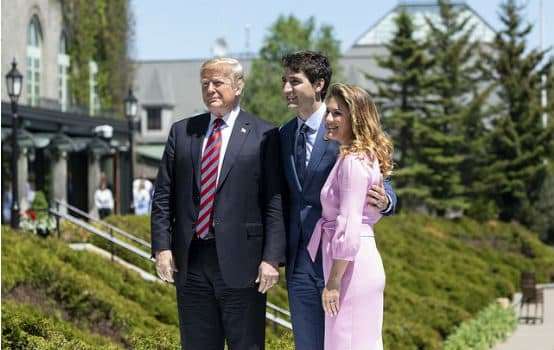
For their latest cover story, staffers at The Economist threw away their customary high-brow diplo-speak in favor of a terse lecture on how destabilizing and unhelpful the American president’s view of the world is. Trump, the paper opined, was lording over America’s allies like the class bully on the playground. “[I]t is hard to think of a president who bullies as gleefully as Mr Trump,” The Economist said. “No other modern president has routinely treated America’s partners so shoddily or eschewed the idea of leading through alliances.”
Tough words from one of the world’s most influential weeklies. In hindsight, however, The Economist‘s castigation was a mild rebuke in comparison to the wholesale disgust leveled against him by mainstream politicians, newspapers, and foreign policy experts after last weekend’s G-7 summit outside Quebec.
In typical bull-in-the-china-shop fashion, Trump landed on Canadian soil, forced the group to endure a day of tirades against unfair trade practices, and departed on Air Force One shortly thereafter, skipping sessions on climate change and the world’s oceans. This year’s G-7, a forum established in the 1950s to get the world’s wealthiest nations on the same page, was less the choreographed, happy family photo-op we’ve grown used to than an adversarial family reunion instigated by the patriarch.
The Macrons and Merkels of the world wanted this gathering of democracies to go smoothly. Instead, it ended with Trump refusing to sign a G-7 communique after Canadian Prime Minister Justin Trudeau’s speech against steel and aluminum tariffs (which Trump interpreted as a disrespectful hatchet job by a “meek and mild” political hack). The normally stoic Angela Merkel called the affair “depressing.” German and French officials, who had their own heated arguments with Trump on trade and tariffs, couldn’t believe their American colleague was willing to walk away from a statement he’d agreed to hours earlier. To German Foreign Minister Heiko Maas, Trump refusing to sign was one more rough wave crashing into the rickety boat that is the transatlantic relationship. “In a matter of seconds, you can destroy trust with 280 Twitter characters. To build that up again will take much longer,” Maas remarked.
- Trump Unleashes the Dogs of a Trade War
- The G-7 Debacle and the Summit in Singapore
France, Germany, the UK, Italy, Japan, and Canada all knew that this year’s G-7 meetings were going to be more difficult than most. With the exception of Giuseppe Conte, the new Italian premier of an anti-establishment, populist coalition government, all of the forum’s heads-of-state are multilateralists to their core. French President Emmanuel Macron, German Chancellor Merkel, and UK Prime Minister Theresa May sprinkled their speeches with references to the “liberal, rules-based international order,” a catchall euphemism for free trade between nations, respect for international law, and the importance of global institutions like the United Nations and the European Union. Each one realized that he or she would have to sit President Trump down and explain that throwing that order away in place of unending competition between nations would be a big mistake. Donald Tusk, the president of the European Council, used his opening remarks to remind his fellow multilateralists never to hesitate in defending the global order—even if they find themselves in opposition to the president of the United States.
Trump didn’t want to hear the lectures. In fact, according to his advisors, he didn’t want to fly to Canada at all. Though he ended up going, he spent much of the day ranting about the United States getting taken advantage of financially and militarily. He lambasted the Canadians for their high tariffs on U.S. dairy products, repeated his contention that Uncle Sam is being taken for a ride by supposed friends, publicly supported reincorporating Russia back into the group, and left Quebec a day early only to attack Justin Trudeau on Twitter. Not even in Merkel’s worst nightmares did she think Trump would hurl insults at the Canadians—the Canadians, of all people!
Pick up a European newspaper or scroll through the commentariat and you will find headline after headline counting down the days before the Western order implodes. The Atlantic’s David Frum writes that Trump has gone to war with the very Western democracies he’s supposed to be leading, while the Washington Post’s Max Boot suggests the transatlantic alliance will die in Canada thanks to Trump’s churlishness. In an editorial, the Financial Times stated that “it would have been better if President Donald Trump had carried out his threat and declined to attend the summit at all.” Only on the fringes of right-wing media has anyone argued that Trump’s trip to Canada was a success. The nicest thing anybody to the left of Sean Hannity and Nigel Farage had to say was along the lines of “hey, at least we aren’t at war with Canada yet.”
Is the transatlantic community dying a slow and painful death? Is the world order as we’ve known it for over 70 years starting to unravel? Are the United States and Europe about to cut ties and go their own way? Not necessarily: Washington, Brussels, London, and Tokyo still have plenty of mutual national security interests that bind them together. Tariffs, Trump’s personality, and threats of trade wars aside, the countries of the West are on the same side on a lot of issues, whether it’s denuclearizing the Korean Peninsula or fighting Islamic terrorism.
But even Trump supporters have to be admit that in certain situations, the president doesn’t make the job easy. The G-7 summit was one of them.
Daniel R. DePetris is a foreign policy analyst, a columnist at Reuters, and a frequent contributor to The American Conservative.
Sourse: theamericanconservative.com






